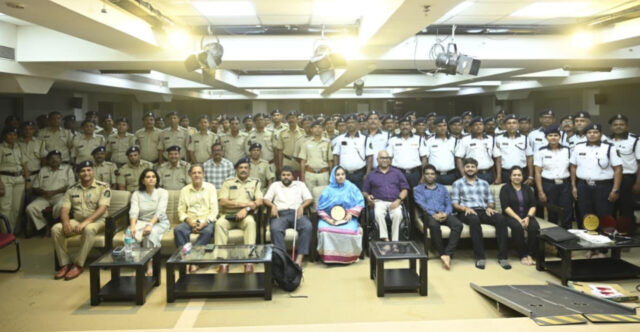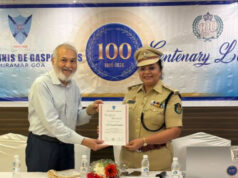In a move towards inclusive law enforcement, the Goa Police successfully concluded its first-ever four-day sensitisation and awareness training on the Rights of Persons with Disabilities (RPwD) Act, 2016, held from August 18–21, 2025; held in Panaji.
The programme, themed “Inclusive Policing for a Barrier-Free Goa,” was organised by the Department for Empowerment of Persons with Disabilities (DEPwD) and the State Commissioner for Persons with Disabilities, in collaboration with Goa Police and iProbono India as knowledge partners. It aimed to train police personnel to engage with persons with disabilities with empathy, dignity, and sensitivity.
At the valedictory session, Varsha Sharma, IPS, Dy Inspector General of Police, commended the initiative and expressed her personal appreciation.
“This training touched me deeply. We are all equal—we learn in the same schools, live in the same society. It is our duty to support persons with disabilities, even in our busiest schedules. This sensitisation is essential for every police officer,” she said.
On behalf of the State Control Police Room, Deputy Superintendent of Police Roy Pereira extended gratitude and presented mementos to all resource persons and supporting departments as a token of appreciation.
The training has been hailed as a landmark initiative, with senior officials emphasising the need to extend such sessions to taluka-level police stations across Goa.
Officials believe the programme sets a national example, positioning Goa as a leader in inclusive, barrier-free policing that upholds the rights and dignity of persons with disabilities.
Training Highlights:
Over 650 police personnel from the State Police Control Room, Traffic Police, and Pink Force were trained in batches across four days. Sessions covered legal rights, accessibility, communication techniques, and social perspectives of disability.
The training was highly interactive, with police participants remarking that such sessions were “much-needed” and gave them “new knowledge insights and confidence” to handle real-life situations.
Inspiring Sessions:
DySP Pereira noted that with over 5% of Goa’s population living with disabilities, equipping police officers with such skills was a necessity long overdue.
On the second day, Dr. Mriselda Montero, Deputy Director, Department of Empowerment of Persons with Disabilities, graced the training and emphasised the urgent need for sensitisation of police personnel.
On the third day, SP of Traffic Cell, Pramod Shirvoikar, movingly shared his relative’s story of turning blind. He reminded officers that while sighted people enjoy the beauty of nature, persons with disabilities often overcome far greater challenges—excelling in sports, UPSC exams, and various professions. “They can do everything that others can, if given the right support,” he said.
Taha Haaziq, Secretary to the State Commissioner for Persons with Disabilities, highlighted that Goa is the first state in India to publish a Standard Operating Procedure (SOP) for police on interacting with persons with disabilities, making the state a pioneer in inclusive policing.
Advocate Kaurvaki Mohanty, Program Manager at iProbono India, called the SOP a “progressive and practical tool” to guide law enforcement.
Senior journalist and Goa State Disability Advisory Board Member, Prakash Kamat, narrated real-life cases where timely police intervention could prevent injustice, stressing the importance of awareness and made a forceful case for effective implementation of Police Helpline abd SoP for PswD.
Other resource persons included Advocate Amla Shejwadkar, Zehra Naqvi, Vishant Nagvekar (Advisory Member to the State Commissioner), Mahadev D. Sawant (Advisory Member of state commissioner for PWDs, Executive member of NAB GOA and program compere), Prasad Joshi (Deaf Association of Goa), Jamila Haaziq (Office of the State Commissioner), and Josephine Fernandes, who provided sign language interpretation throughout the sessions.






